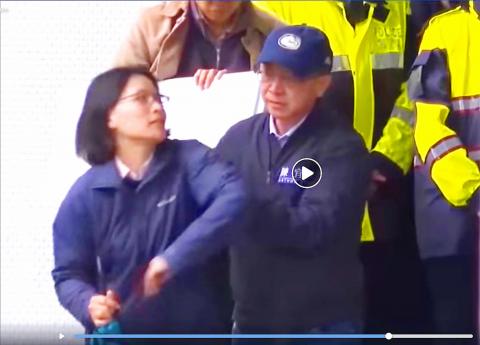The Democratic Progressive Party (DPP) yesterday released a video that appears to show a Chinese Nationalist Party (KMT) legislator pushing a policewoman at a protest in Taipei the previous day.
A group of 10 to 20 KMT lawmakers and some city councilors on Friday tried to enter the Ministry of Foreign Affairs building to demand that Minister of Foreign Affairs Joseph Wu (吳釗燮) offer an explanation for the suicide last year of Su Chii-cherng (蘇啟誠), the then-director-general of the Osaka branch of the Taipei Economic and Cultural Office in Japan.
However, police at the main entrance blocked the KMT members and a scuffle ensued.

Photo: Screen grab from Deputy Legislative Speaker Tsai Chi-chang’s Facebook account
The footage, shared by DPP Legislator Wang Ting-yu (王定宇), appears to show KMT Legislator Arthur Chen (陳宜民) asking the policewoman what her unit is and knocking her cap off before pushing her.
KMT legislators William Tseng (曾銘宗) and Lin Te-fu (林德福) appear to physically intimidate a junior official from the ministry’s press room and repeatedly ask him whether he is a National Security Bureau agent.
The video appeares to show another ministry official being confronted by Taipei City Councilor William Hsu (徐弘庭) and New Taipei City Councilor Lin Chin-chieh (林金結).
KMT legislators Lin Yi-hua (林奕華) and Chen Yu-jen (陳玉珍) were caught in the altercation for more than an hour, during which Chen Yu-jen fainted and Lin Yi-hua sustained serious bruises, the KMT said, adding that the two sought medical treatment at National Taiwan University Hospital.
The National Police Agency’s Special Police Sixth Corps on Friday said it would bring charges against Arthur Chen for obstruction of official duty, adding that the officer is a member of the corps.
Arthur Chen later that night said on Facebook that he was “caught up in the moment” and called on the officer to provide video evidence of the altercation.
The KMT said its lawmakers wanted the ministry to show accountability over Su’s death after Yang Hui-ju (楊蕙如), a former campaign aide to Representative to Japan Frank Hsieh (謝長廷), was on Tuesday indicted for hiring people to influence public opinion online and attack or deride opponents.
Yang allegedly directed an online campaign to defend Hsieh by accusing Su of dereliction of duty and failing to help Taiwanese stuck at Japan’s Kansai Airport when Typhoon Jebi hit the country on Sept. 4 last year.
The accusations stemmed from a fabricated news story that the Chinese embassy in Japan sent buses to evacuate Chinese stranded at the airport.
Although the report was later proven to be false, it sparked criticism of perceived inaction by the ministry to help Taiwanese stranded at the airport.
The hired Internet users allegedly called Su and other branch personnel “festering remnants of the party-state ruled by the KMT,” and wished death upon them, which some said might have contributed to Su committing suicide at his residence in Osaka eight days later.

CHAOS: Iranians took to the streets playing celebratory music after reports of Khamenei’s death on Saturday, while mourners also gathered in Tehran yesterday Iranian Supreme Leader Ayatollah Ali Khamenei was killed in a major attack on Iran launched by Israel and the US, throwing the future of the Islamic republic into doubt and raising the risk of regional instability. Iranian state television and the state-run IRNA news agency announced the 86-year-old’s death early yesterday. US President Donald Trump said it gave Iranians their “greatest chance” to “take back” their country. The announcements came after a joint US and Israeli aerial bombardment that targeted Iranian military and governmental sites. Trump said the “heavy and pinpoint bombing” would continue through the week or as long

TRUST: The KMT said it respected the US’ timing and considerations, and hoped it would continue to honor its commitments to helping Taiwan bolster its defenses and deterrence US President Donald Trump is delaying a multibillion-dollar arms sale to Taiwan to ensure his visit to Beijing is successful, a New York Times report said. The weapons sales package has stalled in the US Department of State, the report said, citing US officials it did not identify. The White House has told agencies not to push forward ahead of Trump’s meeting with Chinese President Xi Jinping (習近平), it said. The two last month held a phone call to discuss trade and geopolitical flashpoints ahead of the summit. Xi raised the Taiwan issue and urged the US to handle arms sales to

State-run CPC Corp, Taiwan (CPC, 台灣中油) yesterday said that it had confirmed on Saturday night with its liquefied natural gas (LNG) and crude oil suppliers that shipments are proceeding as scheduled and that domestic supplies remain unaffected. The CPC yesterday announced the gasoline and diesel prices will rise by NT$0.2 and NT$0.4 per liter, respectively, starting Monday, citing Middle East tensions and blizzards in the eastern United States. CPC also iterated it has been reducing the proportion of crude oil imports from the Middle East and diversifying its supply sources in the past few years in response to geopolitical risks, expanding

Pro-democracy media tycoon Jimmy Lai’s (黎智英) fraud conviction and prison sentence were yesterday overturned by a Hong Kong court, in a surprise legal decision that comes soon after Lai was jailed for 20 years on a separate national security charge. Judges Jeremy Poon (潘兆初), Anthea Pang (彭寶琴) and Derek Pang (彭偉昌) said in the judgement that they allowed the appeal from Lai, and another defendant in the case, to proceed, as a lower court judge had “erred.” “The Court of Appeal gave them leave to appeal against their conviction, allowed their appeals, quashed the convictions and set aside the sentences,” the judges